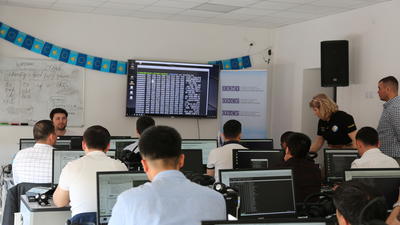-
Our work
-
Fields of work
- Arms control
- Border management
- Combating trafficking in human beings
- Conflict prevention and resolution
- Countering terrorism
- Cyber/ICT Security
- Democratization
- Economic activities
- Education
- Elections
- Environmental activities
- Gender equality
- Good governance
- Human rights
- Media freedom and development
- Migration
- National minority issues
- Policing
- Reform and co-operation in the security sector
- Roma and Sinti
- Rule of law
- Tolerance and non-discrimination
- Youth
- Field operations
- Projects
-
Meetings and conferences
- Summit meetings
- Review Conferences
- Ministerial Council meetings
- Plenary meetings of the Permanent Council
- Plenary Meetings of the Forum for Security Co-operation
- Security Review Conferences
- Annual Implementation Assessment Meetings
- Economic and Environmental Forum
- Economic and Environmental Dimension Implementation Meetings
- Human rights meetings
- Media conferences
- Cyber/ICT security conferences
- Conference of the Alliance against Trafficking in Persons
- Gender equality conferences
- Annual OSCE Mediterranean conferences
- Annual OSCE Asian conferences
- Partnerships
-
Fields of work
-
Countries
- All
-
Participating States
- Albania
- Andorra
- Armenia
- Austria
- Azerbaijan
- Belgium
- Belarus
- Bosnia and Herzegovina
- Bulgaria
- Canada
- Croatia
- Cyprus
- Czechia
- Denmark
- Estonia
- Finland
- France
- Georgia
- Germany
- Greece
- Holy See
- Hungary
- Iceland
- Ireland
- Italy
- Kazakhstan
- Kyrgyzstan
- Latvia
- Liechtenstein
- Lithuania
- Luxembourg
- Malta
- Moldova
- Monaco
- Mongolia
- Montenegro
- The Netherlands
- North Macedonia
- Norway
- Poland
- Portugal
- Romania
- Russian Federation
- San Marino
- Serbia
- Slovakia
- Slovenia
- Spain
- Sweden
- Switzerland – OSCE Chairpersonship 2026
- Tajikistan
- Türkiye
- Turkmenistan
- Ukraine
- United Kingdom
- United States of America
- Uzbekistan
- Asian Partners for Co-operation
- Mediterranean Partners for Co-operation
-
Structures and institutions
- Chairpersonship
-
Secretariat
- Secretary General
- Office of the Secretary General
- Conflict Prevention Centre
- Transnational Threats Department
- Office of the Special Representative and Co-ordinator for Combating Trafficking in Human Beings
- Office of the Co-ordinator of OSCE Economic and Environmental Activities
- Gender Issues Programme
- Opportunities for Youth
- Department of Human Resources
- Department of Management and Finance
- Office of Internal Oversight
- Documentation Centre in Prague
- Institutions
-
Field operations
- Presence in Albania
- Centre in Ashgabat
- Programme Office in Astana
- Programme Office in Bishkek
- Mission to Bosnia and Herzegovina
- Programme Office in Dushanbe
- Mission in Kosovo
- Mission to Moldova
- Mission to Montenegro
- Mission to Serbia
- Mission to Skopje
- Project Co-ordinator in Uzbekistan
- Closed field activities
- Parliamentary Assembly
- Court of Conciliation and Arbitration
- Organizational structure
- About us
News Item
OSCE trains Central Asian law enforcement experts to combat cybercrime through open source digital forensics
Law enforcement experts from Kazakhstan, Kyrgyzstan and Uzbekistan have improved their capacity to fight cybercrime through a training course organized on 16-20 May by the OSCE Transnational Threats Department in close co-operation with the OSCE Programme Office in Nur-Sultan and the Law Enforcement Academy under the General Prosecutor’s Office of the Republic of Kazakhstan.

- Issued on:
- Issued by:
- OSCE Secretariat, OSCE Programme Office in Astana
- Fields of work:
- Cyber/ICT Security
Law enforcement experts from Kazakhstan, Kyrgyzstan and Uzbekistan have improved their capacity to fight cybercrime through a training course organized on 16-20 May by the OSCE Transnational Threats Department in close co-operation with the OSCE Programme Office in Nur-Sultan and the Law Enforcement Academy under the General Prosecutor’s Office of the Republic of Kazakhstan.
The course was the first part of the two-week training programme originally developed by the European Cybercrime Training and Education Group (ECTEG). It provided participants with knowledge and skills necessary for understanding steps and key principles of a digital forensic process, reading computer data and using available open-source forensic tools to analyze data.
Digital forensic experts from Estonia, Georgia, Norway and Romania delivered the training. Participants also completed a half-day online session on human rights compliance in cybercrime investigations that was delivered by legal experts from Slovenia and the Netherlands.
“Cybercrime is one of the key challenges of our time. Cyberspace has no territorially based boundaries and, therefore, international co-operation is absolutely necessary if we want to effectively address threats emanating from it. Our Academy is proud to host this regional course and in co-operation with our international partners, such as the OSCE, our ambition is to become a regional training hub for combatting cybercrime and increasing cybersecurity in Central Asia in the future,” said Magomed Akaev, the Director of the Institute of Professional Development at the Law Enforcement Academy in his opening remarks.
The course was delivered within the framework of the OSCE extra-budgetary project “Capacity Building on Combating Cybercrime in Central Asia” funded by the United States of America and the Republic of Korea. The second part of the course will take place on 20-24 June 2022.